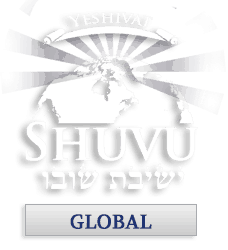וַיְדַבֵּ֥ר יְהֹוָ֖ה אֶל־משֶׁ֥ה לֵּאמֹֽר: דַּבֵּ֞ר אֶל־בְּנֵ֤י יִשְׂרָאֵל֙ לֵאמֹ֔ר אִשָּׁה֙ כִּ֣י תַזְרִ֔יעַ וְיָֽלְדָ֖ה זָכָ֑ר וְטָֽמְאָה֙ שִׁבְעַ֣ת יָמִ֔ים כִּימֵ֛י נִדַּ֥ת דְּוֹתָ֖הּ תִּטְמָֽא: וּבַיּ֖וֹם הַשְּׁמִינִ֑י יִמּ֖וֹל בְּשַׂ֥ר עָרְלָתֽוֹ: וּשְׁלשִׁ֥ים יוֹם֙ וּשְׁל֣שֶׁת יָמִ֔ים תֵּשֵׁ֖ב בִּדְמֵ֣י טָֽהֳרָ֑ה בְּכָל־קֹ֣דֶשׁ לֹֽא־תִגָּ֗ע וְאֶל־הַמִּקְדָּשׁ֙ לֹ֣א תָבֹ֔א עַד־מְלֹ֖את יְמֵ֥י טָהֳרָֽהּ׃
And the Lord spoke to Moses, saying: Speak to the children of Israel, saying: If a woman conceives and gives birth to a male, she shall be unclean for seven days; as [in] the days of her menstrual flow, she shall be unclean. And on the eighth day, the flesh of his foreskin shall be circumcised. And for thirty three days, she shall remain in the blood of purity; she shall not touch anything holy, nor may she enter the Sanctuary, until the days of her purification have been completed.
Leviticus 12:1-4
שָׁל֣שׁ רְגָלִ֔ים תָּחֹ֥ג לִ֖י בַּשָּׁנָֽה: אֶת־חַ֣ג הַמַּצּוֹת֘ תִּשְׁמֹר֒ שִׁבְעַ֣ת יָמִים֩ תֹּאכַ֨ל מַצּ֜וֹת כַּֽאֲשֶׁ֣ר צִוִּיתִ֗ךָ לְמוֹעֵד֙ חֹ֣דֶשׁ הָֽאָבִ֔יב כִּי־ב֖וֹ יָצָ֣אתָ מִמִּצְרָ֑יִם וְלֹא־יֵֽרָא֥וּ פָנַ֖י רֵיקָֽם: וְחַ֤ג הַקָּצִיר֙ בִּכּוּרֵ֣י מַֽעֲשֶׂ֔יךָ אֲשֶׁ֥ר תִּזְרַ֖ע בַּשָּׂדֶ֑ה וְחַ֤ג הָֽאָסִף֙ בְּצֵ֣את הַשָּׁנָ֔ה בְּאָסְפְּךָ֥ אֶת־מַֽעֲשֶׂ֖יךָ מִן־הַשָּׂדֶֽה: שָׁל֥שׁ פְּעָמִ֖ים בַּשָּׁנָ֑ה יֵֽרָאֶה֙ כָּל־זְכ֣וּרְךָ֔ אֶל־פְּנֵ֖י הָֽאָדֹ֥ן | יְהֹוָֽה:
Three times you shall slaughter sacrifices to Me during the year. You shall observe the festival of unleavened bread; for seven days you shall eat unleavened bread as I have commanded you, at the appointed time of the month of springtime, for then you left Egypt, and they shall not appear before Me empty handed. And the festival of the harvest, the first fruits of your labors, which you will sow in the field, and the festival of the ingathering at the departure of the year, when you gather in [the products of] your labors from the field. Three times during the year, all your males shall appear before the Master, the Lord.
Exodus 23:14-17
This week’s double portion begins with an explanation of a period of time of contamination for a woman gives birth to a child. During the period of time of the blood of purity (33 days for the birth of a boy, 66 days for the birth of a girl), a woman may not touch anything holy or enter the Temple (Tabernacle.) This instruction given by Hashem to the children of Israel at first glance may create a machloket, a scriptural dilemma.
In Exodus 23, we see the instruction given to the children of Israel that they are to bring sacrifices before the Lord three times a year. This instruction is given to Israel. B’nai Israel may be translated either as the children of Israel or the sons of Israel. Therefore, who is commanded to come before Hashem three times a year? Is it all the children of Israel, or is it only the sons of Israel?
In this week’s portion, Tazriah, we see that when a woman gives birth, she is forbidden to come to the sanctuary for a minimum of 33 days. What happens when one of the three festivals falls during this period of time of the blood of purification for a woman? She is both commanded to do something and commanded not to do the same thing.
Exodus 23:17 clarifies the commandment. Israel, in this case, refers to the sons of Israel only, not the daughters. Women are not required to go to the Temple three times a year and make a sacrifice. Only the men are required to make the sacrifice. This solves the machloket as women are not required to make the sacrifice. Three times a year, if a woman is not allowed to enter the Temple during her time of the blood of purity, she is not sinning.
The sages use this idea as an instructive point of Torah. Whenever Hashem issues a positive, time-related mitzvah to B’nai Israel, the commandment is meant for males only because there are times when women may not fulfill a positive, time-related mitzvah. For instance, when a woman is in the blood of purification. Therefore, positive, time-related mitzvot are obligations of men, but not obligations of women.
This does not mean that women are not allowed to perform these mitzvot. It means that women are not obligated to perform these mitzvot, rather, they are obligations of only men. There are synagogue prayer, which are obligatory. They are obligations of men, not of women. Why? Because synagogue services are positive, time-related mitzvah. They are to be performed (positive) and they are to be done at specific times. Therefore, women are not obligated. Although there are not obligated, women are not only allowed to pray synagogue services, but are encouraged to do so. It’s just that they are under no obligation to do so. Shabbat shalom.
